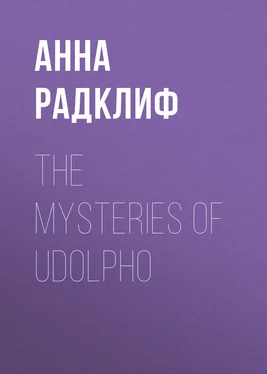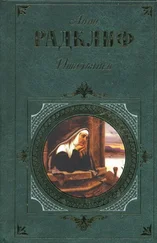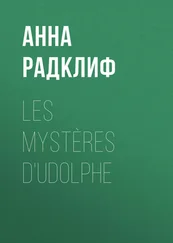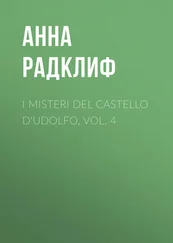Анна Радклиф - The Mysteries of Udolpho
Здесь есть возможность читать онлайн «Анна Радклиф - The Mysteries of Udolpho» — ознакомительный отрывок электронной книги совершенно бесплатно, а после прочтения отрывка купить полную версию. В некоторых случаях можно слушать аудио, скачать через торрент в формате fb2 и присутствует краткое содержание. Жанр: foreign_prose, literature_19, Ужасы и Мистика, foreign_fantasy, foreign_antique, на английском языке. Описание произведения, (предисловие) а так же отзывы посетителей доступны на портале библиотеки ЛибКат.
- Название:The Mysteries of Udolpho
- Автор:
- Жанр:
- Год:неизвестен
- ISBN:нет данных
- Рейтинг книги:5 / 5. Голосов: 1
-
Избранное:Добавить в избранное
- Отзывы:
-
Ваша оценка:
- 100
- 1
- 2
- 3
- 4
- 5
The Mysteries of Udolpho: краткое содержание, описание и аннотация
Предлагаем к чтению аннотацию, описание, краткое содержание или предисловие (зависит от того, что написал сам автор книги «The Mysteries of Udolpho»). Если вы не нашли необходимую информацию о книге — напишите в комментариях, мы постараемся отыскать её.
The Mysteries of Udolpho — читать онлайн ознакомительный отрывок
Ниже представлен текст книги, разбитый по страницам. Система сохранения места последней прочитанной страницы, позволяет с удобством читать онлайн бесплатно книгу «The Mysteries of Udolpho», без необходимости каждый раз заново искать на чём Вы остановились. Поставьте закладку, и сможете в любой момент перейти на страницу, на которой закончили чтение.
Интервал:
Закладка:
'Your sorrow is useless. Do not receive this as merely a commonplace remark, but let reason THEREFORE restrain sorrow. I would not annihilate your feelings, my child, I would only teach you to command them; for whatever may be the evils resulting from a too susceptible heart, nothing can be hoped from an insensible one; that, on the other hand, is all vice—vice, of which the deformity is not softened, or the effect consoled for, by any semblance or possibility of good. You know my sufferings, and are, therefore, convinced that mine are not the light words which, on these occasions, are so often repeated to destroy even the sources of honest emotion, or which merely display the selfish ostentation of a false philosophy. I will shew my Emily, that I can practise what I advise. I have said thus much, because I cannot bear to see you wasting in useless sorrow, for want of that resistance which is due from mind; and I have not said it till now, because there is a period when all reasoning must yield to nature; that is past: and another, when excessive indulgence, having sunk into habit, weighs down the elasticity of the spirits so as to render conquest nearly impossible; this is to come. You, my Emily, will shew that you are willing to avoid it.'
Emily smiled through her tears upon her father: 'Dear sir,' said she, and her voice trembled; she would have added, 'I will shew myself worthy of being your daughter;' but a mingled emotion of gratitude, affection, and grief overcame her. St. Aubert suffered her to weep without interruption, and then began to talk on common topics.
The first person who came to condole with St. Aubert was a M. Barreaux, an austere and seemingly unfeeling man. A taste for botany had introduced them to each other, for they had frequently met in their wanderings among the mountains. M. Barreaux had retired from the world, and almost from society, to live in a pleasant chateau, on the skirts of the woods, near La Vallee. He also had been disappointed in his opinion of mankind; but he did not, like St. Aubert, pity and mourn for them; he felt more indignation at their vices, than compassion for their weaknesses.
St. Aubert was somewhat surprised to see him; for, though he had often pressed him to come to the chateau, he had never till now accepted the invitation; and now he came without ceremony or reserve, entering the parlour as an old friend. The claims of misfortune appeared to have softened down all the ruggedness and prejudices of his heart. St. Aubert unhappy, seemed to be the sole idea that occupied his mind. It was in manners, more than in words, that he appeared to sympathize with his friends: he spoke little on the subject of their grief; but the minute attention he gave them, and the modulated voice, and softened look that accompanied it, came from his heart, and spoke to theirs.
At this melancholy period St. Aubert was likewise visited by Madame Cheron, his only surviving sister, who had been some years a widow, and now resided on her own estate near Tholouse. The intercourse between them had not been very frequent. In her condolements, words were not wanting; she understood not the magic of the look that speaks at once to the soul, or the voice that sinks like balm to the heart: but she assured St. Aubert that she sincerely sympathized with him, praised the virtues of his late wife, and then offered what she considered to be consolation. Emily wept unceasingly while she spoke; St. Aubert was tranquil, listened to what she said in silence, and then turned the discourse upon another subject.
At parting she pressed him and her niece to make her an early visit. 'Change of place will amuse you,' said she, 'and it is wrong to give way to grief.' St. Aubert acknowledged the truth of these words of course; but, at the same time, felt more reluctant than ever to quit the spot which his past happiness had consecrated. The presence of his wife had sanctified every surrounding scene, and, each day, as it gradually softened the acuteness of his suffering, assisted the tender enchantment that bound him to home.
But there were calls which must be complied with, and of this kind was the visit he paid to his brother-in-law M. Quesnel. An affair of an interesting nature made it necessary that he should delay this visit no longer, and, wishing to rouse Emily from her dejection, he took her with him to Epourville.
As the carriage entered upon the forest that adjoined his paternal domain, his eyes once more caught, between the chesnut avenue, the turreted corners of the chateau. He sighed to think of what had passed since he was last there, and that it was now the property of a man who neither revered nor valued it. At length he entered the avenue, whose lofty trees had so often delighted him when a boy, and whose melancholy shade was now so congenial with the tone of his spirits. Every feature of the edifice, distinguished by an air of heavy grandeur, appeared successively between the branches of the trees—the broad turret, the arched gate-way that led into the courts, the drawbridge, and the dry fosse which surrounded the whole.
The sound of carriage wheels brought a troop of servants to the great gate, where St. Aubert alighted, and from which he led Emily into the gothic hall, now no longer hung with the arms and ancient banners of the family. These were displaced, and the oak wainscotting, and beams that crossed the roof, were painted white. The large table, too, that used to stretch along the upper end of the hall, where the master of the mansion loved to display his hospitality, and whence the peal of laughter, and the song of conviviality, had so often resounded, was now removed; even the benches that had surrounded the hall were no longer there. The heavy walls were hung with frivolous ornaments, and every thing that appeared denoted the false taste and corrupted sentiments of the present owner.
St. Aubert followed a gay Parisian servant to a parlour, where sat Mons. and Madame Quesnel, who received him with a stately politeness, and, after a few formal words of condolement, seemed to have forgotten that they ever had a sister.
Emily felt tears swell into her eyes, and then resentment checked them. St. Aubert, calm and deliberate, preserved his dignity without assuming importance, and Quesnel was depressed by his presence without exactly knowing wherefore.
After some general conversation, St. Aubert requested to speak with him alone; and Emily, being left with Madame Quesnel, soon learned that a large party was invited to dine at the chateau, and was compelled to hear that nothing which was past and irremediable ought to prevent the festivity of the present hour.
St. Aubert, when he was told that company were expected, felt a mixed emotion of disgust and indignation against the insensibility of Quesnel, which prompted him to return home immediately. But he was informed, that Madame Cheron had been asked to meet him; and, when he looked at Emily, and considered that a time might come when the enmity of her uncle would be prejudicial to her, he determined not to incur it himself, by conduct which would be resented as indecorous, by the very persons who now showed so little sense of decorum.
Among the visitors assembled at dinner were two Italian gentlemen, of whom one was named Montoni, a distant relation of Madame Quesnel, a man about forty, of an uncommonly handsome person, with features manly and expressive, but whose countenance exhibited, upon the whole, more of the haughtiness of command, and the quickness of discernment, than of any other character.
Signor Cavigni, his friend, appeared to be about thirty—inferior in dignity, but equal to him in penetration of countenance, and superior in insinuation of manner.
Emily was shocked by the salutation with which Madame Cheron met her father—'Dear brother,' said she, 'I am concerned to see you look so very ill; do, pray, have advice!' St. Aubert answered, with a melancholy smile, that he felt himself much as usual; but Emily's fears made her now fancy that her father looked worse than he really did.
Читать дальшеИнтервал:
Закладка:
Похожие книги на «The Mysteries of Udolpho»
Представляем Вашему вниманию похожие книги на «The Mysteries of Udolpho» списком для выбора. Мы отобрали схожую по названию и смыслу литературу в надежде предоставить читателям больше вариантов отыскать новые, интересные, ещё непрочитанные произведения.
Обсуждение, отзывы о книге «The Mysteries of Udolpho» и просто собственные мнения читателей. Оставьте ваши комментарии, напишите, что Вы думаете о произведении, его смысле или главных героях. Укажите что конкретно понравилось, а что нет, и почему Вы так считаете.












